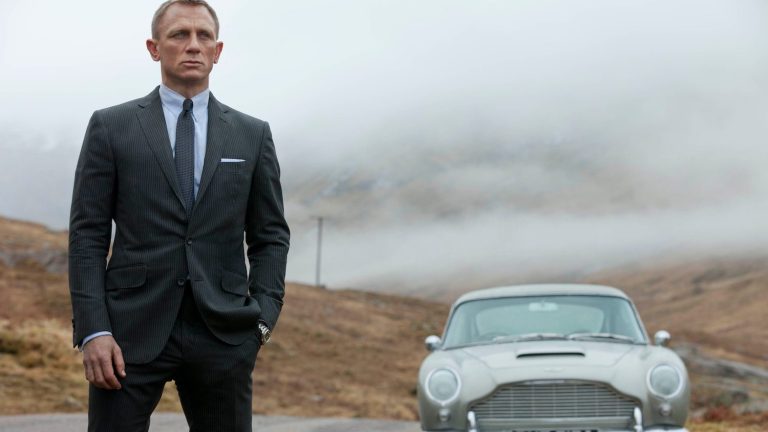James Bond Needs to Have Fun Again
After 15 years of Daniel Craig's "blunt instrument" interpretation, it's time for James Bond to love what he's doing again, one martini at a time.

James Bond is dead. Blown up by a big old bunch of missiles to destroy the nanobots he was infected with.
At least, this Bond, the one played by Daniel Craig, is dead. He’s also the Bond who we first met beating up a guy in a toilet in the moody black and white opening of Casino Royale. And with him dies the first properly 21st-century take on Bond, hailed as a complete reinvention of the character despite being written by the same screenwriters who supposedly killed the franchise in fans’ minds with Die Another Day (not to mention Johnny English, but we’ll come to that later).
This Bond was fresh, new, and yet also harked back to the origins of the character—adapting Ian Fleming’s very first Bond novel to create an origin story for the agent (at a time when those were very in vogue).
Where previous Bonds were strapped to a table with a laser beam pointed at their crotch, this Bond made do with a bottomless chair and a bit of knotted rope.
Is it too much to ask the next 007 not be so shy about lasers?
Why So Serious?
Daniel Craig’s James Bond was gritty, brutal, and cold. The suavity and wit, and cheeky-if-slightly-misogynist pun names were gone. Craig gave us a Bond who was a thug in a tuxedo, a government assassin who cared about nothing outside of the mission.
It helped enormously that Craig himself intermittently despised the character he played. When asked what we could learn from Bond in our day-to-day lives, Craig once famously answered “nothing,” adding later in the same interview that “let’s not forget that he’s actually a misogynist.” Craig never worshipped the secret agent as the epitome of cool and heroism. He played him as a damaged, dangerous individual whose skillset happened to be useful to Her Majesty’s Secret Service.
But this version of the character was not born in a vacuum. Part of the reason Casino Royale and its sequels created this take on the character was that it was the only version of the character that could exist by the 2000s.
As we already mentioned, Robert Wade and Neal Pervis not only contributed to every one of Craig’s scripts, on top of Pierce Brosnan’s final two trips in the tuxedo, but they also wrote Johnny English, a Rowan Atkinson vehicle based on a series of Barclaycard adverts with the always hilarious premise “What if James Bond was useless?”
That film, in turn, likely owed its existence to the enormous commercial success of the Austin Powers trilogy. While everyone from ‘60s DJ Simon Dee to Michael Caine has claimed to be an inspiration for the character, ultimately the films were such a thorough deconstruction of the Bond movies that we could have quite simply never made one again. Funny gadgets, rampant promiscuity, evil villains who leave their prisoners unsupervised in elaborate but easily escapable death traps. Austin Powers: International Man of Mystery (1997) alone systematically destroys every iconic element of the Bond movies as we knew them.
Meanwhile The Bourne Identity gave us another secret agent with the initials “JB,” but this one had gone rogue—no gadgets, no back-up, no orders even: just lots of highly kinetic hand-to-hand combat with lots of improvised weaponry, the occasional bit of parkour, and the still-obligatory “car chase through a European city with far-too-narrow-streets” (because some classic you do not mess with).
Casino Royale (2006) had to appeal to the Jason Bourne fans while not setting itself up as low-hanging fruit for the Austin Powers crowd. Sixteen years later though, the Austin Powers franchise has been all but forgotten. Jason Bourne has pretty much played out, and there is a sense everywhere you go that we have had enough of “gritty and uncompromising” in our pop culture fiction. We are ready to swing the pendulum the other way!
The Case for a Lighter Bond
This isn’t only our idea either. Edgar Wright, the director behind Baby Driver, Last Night In Soho, and the not-short-of-knowing-winks action movie, Hot Fuzz, has argued that if Craig is a “dark chocolate” Bond, then the franchise is “crying out for another milk chocolate Bond.” In the podcast Happy Sad Confused, Wright said, “I do have a take [on Bond], and if they ever ask me, I’ll pitch it to them. So I’m not going to say it, but when I see some of the names being bandied around, I can’t quite see it, and they seem like Daniel Craig II.”
Even within Craig’s own run, as the films carried on we saw more knowing winks find their way in. Skyfall is often lauded as the highpoint of Craig’s reign as 007, but the most striking thing about it is that it is structurally almost a precisely played-straight remake of the Steve Carrel vehicle, Get Smart. In a tech-savvy, surveillance-based world, old-school spy work is increasingly seen as obsolete. As Bond wrestles with this, he finds the agency he works for is corrupted and so goes rogue, in the process stealing some retro hallmarks of his trade (in this case an Aston Martin DB5), before engaging in some classic action spy antics that show that good old-fashioned 007ing has still got it. The same movie installs a man as the new M and brings back the previously discarded characters of Q and Moneypenny.
It feels like a return to form—or a bit regressive and fan-please-y, depending on your mood. But what it does show is that whatever you try to do with Bond, the character is always trying to regress toward the mean.
So… That Just Happened
And now we’re in a very different cinema landscape. In the ‘00s, “a billionaire in a carefully-non-specific Middle Eastern warzone builds himself a robot suit” was seen as wildly outlandish; it looks like Dogme 95 compared to Marvel’s latest outings.
But much more than the bigger special effects budgets, the big impact Marvel has had on modern cinema is Joss Whedon. Not just by giving him the Avengers flicks for a spell, but in that, gradually, virtually every writer in Marvel’s bullpen has slid into that “dramatic, dramatic, subvert” rhythm that began life in Buffy the Vampire Slayer. And where Marvel goes, so does the entire film industry. For instance, every role ever given to Chris Pratt, for good or ill (hence the great tragedy that Whedon will never write for what surely would’ve been his true muse).
Are people sick to death of that style? Yes, absolutely. But the problem isn’t the humor; it’s that it’s always the same kind of humor. A 21st century version of Roger Moore’s arch, self-aware eyebrow-raising quips could be the precise “the same but different” flavor Hollywood lies awake at night dreaming about.
We’re Going to Need Gadgets. Lots of Gadgets.
The other area of Bond’s universe that has been somewhat neglected during the last 20 years is his famous gadgets. With high points that include a garotte in a wristwatch, scuba gear with a duck hat for stealth, X-ray glasses, jet packs, and killer cigars, gadgets have always been part of his main appeal. But at some point, smartphones were invented and from then on the best gadgets you could hope to see Bond with were shiny black rectangles with prominently positioned branding.
More often than not, Bond now has to rely on stuff like “resourcefulness,” which is, frankly, boring.
So, let’s go whacky on the gadget again. Give Q something to really monologue about: Wigs with concealed helicopter blades for a quick getaway; a car that converts into a hot air balloon; a mobile phone that you can unfold into a set of comfortable loafers.
It’s Only A Matter of Time Before We See A Real Life Volcano Base
Another trope that even Austin Powers couldn’t kill is the bit where the villain says, “We’re not so different, you and I.” In his time, Craig’s Bond faced a parade of cold, professional, yet damaged psychopaths who had become disillusioned with the corrupt system that made them and discarded them after they outlived their usefulness. Partly this is because of the whole mood Craig’s Bond tries to set: grounded, gritty, if not actually “realistic,” then at least a kind of hyper-reality that poses as realism.
But the thing is that today’s villains are truly, properly comic book. Miss the days when Bond was fighting the Russians? Well congratulations, Putin has firmly put them back in play as the villains on the geopolitical scene. Do you prefer your villains to be megalomaniac billionaires intent on destroying the world so they can rebuild it in their own image? Just look at the news!
Using drilling machines to build his own private tunnel system beneath a major city? Holding a war-torn country’s communication satellites hostage when they bruise his ego? Buying up one of the world’s biggest social media sites and driving it into the ground because it said mean things about you?
Not only are these old school Bond villain schemes, but they are also all plans made by the same guy. The only problem with our current crop of real-world supervillains is, frankly, they aren’t the intellectual heavyweights we’re used to seeing Bond face off against.
But also, these aren’t villains to be taken out by a “blunt instrument.” These are people that need approaching with a bit of class, a bit of charm, with the ability to flatter and spar with their enemies. Someone with a knowing wink who knows their way around the sharp end of a double entendre.
Meanwhile Bond is also representing a post-Brexit country whose international standing becomes more of a joke, a Bond that can laugh at himself might be our only hope.
